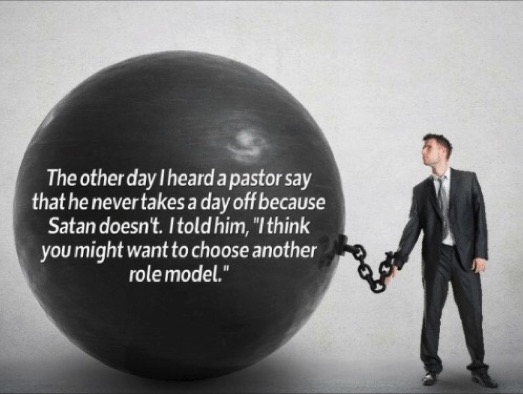burnout
Helping Your Pastor Avoid Burn-Out
11/12/19 Filed in: Caring for Your Pastor

This is the time of year when opportunities for Burn-Out pick up momentum and power. Many pastors adopt a hold-on-tight-and-just-get-through mentality to help them survive this time of year. Wouldn’t it be great if this year was different?
I’m writing this more for those NOT in church leadership, and there is a reason for this.
I have found over the last number of years in doing pastoral care that those in ministry typically have no problem making sacrifices to help others in need. “Call me at 2:30am and I’m there!” And they mean it! There’s even a bit of excitement about getting to do something like that. It’s what pastors are built for.
I also have found that those in church leadership usually, although often begrudgingly, learn to accept help from others. The older a pastor gets and the longer the ministry tenure is, the more the pastor realises he just can’t do everything by himself. Events of life teach pastors that they really do need others: the birth of a first child, waking up on a Sunday morning with a violent stomach flu (or kidney stone – that was my experience), dealing with messy personalities on the leadership team, walking through a complicated building programme, etc. all have an undeniable way of teaching pastors they need others.
So those in ministry do a great job of taking care of others. They learn to accept help from others. But they tend to absolutely stink at taking care of themselves! It just feels too selfish. I’ve worked to help those in ministry learn that if they don’t take care of themselves, they won’t be around to do God’s work very long. But that is a difficult message to accept, at least until they come to the point of burn out.
So – you NOT in church leadership – can I ask you to take a look at your church leaders and assess whether they are showing signs of burn-out?

Something else to be aware of as you read through this list: some of these characteristics are personality-driven. In other words, your pastor may do some of these because that is how he is wired, not because he is burned out. What to look for is change. If something you read below is a new way your pastor is being, that is something to be concerned about. Burn-out is a reaction to being overwhelmed. If you see something new in your pastor that is on this list, please check to see how he or she is doing!
Now the list. Oh, one more thing. This list is gleaned from several sources: personal experience, counselling other pastors, and reading articles on the web. I have listed indicators that might be evident to someone looking in from the outside.
Physical Signs
- Little or no physical exercise. For busy pastors, one of the first things that gets jettisoned is exercise. Yet exercise has been proven to be an essential element of balance in the busy person’s life.
- Rarely taking a day off. I remember bragging that I was putting in 80-90 hours a week and not taking a day off for months. And folks, that is nothing to brag about because that is not how God wants us to live. Check with your pastor to see if he is actually taking his day off.
- Rarely taking a vacation. I knew of a pastor who was proud of the fact that he had not taken a vacation in years. We all knew it because his health was broken, his family was a wreck, and he had lost his compassion for people and passion for ministry.
- Frequent head colds. If your pastor seems to be struggling with minor health issues more frequently, it may be a sign that he or she is just really run down and needs a break.
- Dizziness, sleeplessness, headaches, and stomach pains. These were some of the symptoms I experienced when I got to the very edge of burn-out. Once I corrected my path, these symptoms went away almost immediately! They are the body’s way of yelling, “Hey! Slow down!!”
Emotional Signs
- Unusually negative and argumentative. Even the most optimistic pastor has a bad day once in a while. That’s not what I’m talking about. If you have noticed that your pastor is quick on the draw, it might be because burn-out has robbed him of patience.
- Disproportionate anger. We’ve all seen this at some point somewhere. It’s often illustrated in the “Well, that escalated quickly” memes. If a pastor goes from 0-60 on the anger scale in Olympic record time, it may show he needs to take a break.
- Cynicism and/or sarcasm. These are two emotional responses that come largely from a place of defensiveness. When a pastor feels the world is closing in on him, these become part of the arsenal for self-protection.
- Infrequent laughter. Burn-out sucks the joy out of life. If you’re at this year’s church Christmas party or watching the children’s Christmas pageant (two places where there is usually plenty to laugh at), just take notice of your pastor. Is he enjoying this as well? Is she relaxed enough to join in the laughter?
Mental Signs
- Making careless mistakes. Pastoring a church of any size requires a pastor to keep a lot of balls in the air. If your pastor is missing meetings, forgetting promised visits, making a hash of his sermon delivery, or any other number of uncharacteristic mistakes, it may be because his mental stamina is on the edge due to burn-out.

- Repeating stories. I’m hitting that age where this is a characteristic that is more a sign of getting older than burn-out. That’s a different thing altogether. However, if your pastor seems to be frequently forgetting that he already told you something just a few minutes or even days ago, it may be because he is not able to be mentally present in conversations. And that can be a sign of burn-out.
Relational Signs
- Not saying “no” to requests for time. If your pastor is at every meeting and every event, is doing all the hospital and shut-in visitation, has to book appointments weeks in advance because he already has too many appointments, he might need help in saying “no”. Pastors can be pretty bad at doing this, so it may take an intervention-style meeting to give him “permission” to take care of himself by excusing himself from some of those many commitments.
- Not being paid fairly. I’ve met very few pastors who are in ministry for the money. I’ve met many pastors who forgo much-needed pay rises because the church has other pressing financial needs. Christmas is a great time to bless your pastor with a generous…a GENEROUS… love offering. It’s about more than just the money; it’s a great way to show your pastor how much you love him and his family.
- Talking often about how busy he is. This may be a subconscious activity, or it may be his polite way of crying for help! If your pastor is talking about his busy schedule more than usual, instead of pulling out your lecture on pride, check to see if he is at the edge of burn-out and just doesn’t know what to do.

Spiritual Signs
- Preaching a lot of repeat sermons. Look, there are only so many ways you can preach the Christmas story. So, give him a break if the notes in your Bible show he preached this sermon 2,5, and 8 years ago. Beyond that, though, if your pastor is preaching mostly re-runs, it may be because he just doesn’t have the mental, emotional, or spiritual energy to develop new ones. Instead of criticising your pastor, check with him about burn-out possibilities.
- An appearance of dryness in his everyday walk with God. This is a tricky one; you certainly don’t want to get judgemental. But sometimes there is a real issue that needs to be addressed. You might just have a gut feeling, or maybe you really sense the Holy Spirit is helping you see something that needs to be spoken to. But again, if you feel this may be describing your pastor, please see it as something to lovingly address rather than criticise.
So you have just read through this list and now have some concerns that your pastor may be facing burn-out. What do you do? May I suggest a few ideas?
- Pray for your pastor and his family. Pray for them. Pray for them.
- Give this article to your pastor and share with him your concerns for him. Ask him how he is doing and if there is anything you can do to help lighten his burden.
- Write your pastor a note thanking him for his ministry and assuring him of your support.
- Check with your church leadership to see if they are aware of the possible burn-out and see if they have anything in place to help prevent it. Offer to be a part of providing good loving care for your pastor.
Too many good men and women leave church ministry every year because of burn-out. Please don’t let your pastor be part of that statistic!
Hiking the Great Walk
A week ago I hiked the Waikaremoana Great Walk, 46 kilometres in New Zealand bush. It was both a long-time dream come true AND one of the hardest things I have ever done! There were points along the way where I enjoyed the sheer exhilaration of walking hour after hour through New Zealand native bush, and other points where, if I could have, I would have called for someone to come get me out of there! The weather provided rain for two days straight - including one night in an unproven and ultimately unreliable tent -  and then gave me stunningly clear weather on the last day when I was 1100 metres above sea level. I hiked alone for hours at a time and then enjoyed the company of fellow backpackers in the evenings huddled around a struggling fire at night. I followed a clearly marked path for four days, and then got lost 15 minutes from the end. All in all, the walk was a great study in extremes and contrasts – a study I have had time to reflect on since.
and then gave me stunningly clear weather on the last day when I was 1100 metres above sea level. I hiked alone for hours at a time and then enjoyed the company of fellow backpackers in the evenings huddled around a struggling fire at night. I followed a clearly marked path for four days, and then got lost 15 minutes from the end. All in all, the walk was a great study in extremes and contrasts – a study I have had time to reflect on since.
One of the reflections involves a metaphorical look at the various experiences on the different days of hiking in comparison to church ministry.
I walked nearly 17 kilometres that first day. At the beginning, my legs were fresh. I had all the supplies I needed. I was excited about the journey ahead. And I took off with all the confidence of someone who knew the path ahead would be full of fun and excitement. And it was, for the most part. Sure, there were some hard parts – unexpected mud, short and steep climbs, a backpack that seemed to grow heavier as the day went by. But I was feeling good, still relatively fresh. There were also some uncomfortable moments, like swing bridges that seemed to swing a lot more than they bridged. But I still felt a quiet confidence in those moments.
off with all the confidence of someone who knew the path ahead would be full of fun and excitement. And it was, for the most part. Sure, there were some hard parts – unexpected mud, short and steep climbs, a backpack that seemed to grow heavier as the day went by. But I was feeling good, still relatively fresh. There were also some uncomfortable moments, like swing bridges that seemed to swing a lot more than they bridged. But I still felt a quiet confidence in those moments.
However, I made two big mistakes that day.
First, I let myself get very dehydrated. I carried a water bottle in my backpack, but because it was just too inconvenient to stop, remove the backpack, get the bottle out, drink, put the bottle back, put the backpack back on, and then get going again, I did not drink anywhere near enough water. The second big mistake is that I did not rest enough that first day. I just kept charging on, focussed on covering kilometres. I certainly fell into the trap of “destination over journey” that caused me to rush the progress.
I finished the day at the camp site at which I intended to finish. I got there about the time I expected to get there. I had enough energy and time to set up my tent, prepare one of those dehydrated backpacking meals (yuck!), and get organised for that first night’s sleep. But I had done some big damage that day that would make the next day nearly unbearable. And that’s what I want to think about in terms of ministry.
The Journey Begins
Ah, the early years of ministry! You have finished Bible training - ready to change the world. You are fresh, well-trained, and have an idealistic plan for how this journey will go. Sure, there will be some unexpected moments early on, but you have enough energy and momentum to keep going. You feel unstoppable and see early successes. You enjoy seeing lives changed, God’s power working in unexpected ways, and are so grateful you are a part of God’s plans for your community.
Perhaps you are still in those early years where you see most of your ministry ahead of you rather than behind you. What wonderful years those are! There are so many more miles to travel: ministries to try, sermons to preach, lives to impact, spiritual lessons to learn. They truly are wonderful years.
However, there are a couple of dangers you face:
Spiritual Dehydration
Just like my experience on the Great Walk, pastors can get spiritually dehydrated. The water is there, but with the busyness of ministry, it can be inconvenient at times to get that much-needed spiritual drink. At first, you don’t really feel the effects of spiritual dryness. You’re able to keep moving with residual effects from Bible training days. However, you begin to slow down, have less energy, and generally don’t feel as good about what is going on as you might have expected.
The Psalmist wrote, “My soul thirsts for God, for the living God: when shall I come and appear before God?” This verse highlights two aspects of keeping spiritually hydrated.
First, the remedy for thirst is the living God! Not seminars, books, conferences, or even – dare I say it – deeper Bible study. It is God Himself. If you are not deepening your relationship with God, you will slowly dry up - even with these spiritual activities.
Second, the remedy for thirst depends on your choice. The Psalmist asks: “When shall I come and appear before God?” The answer: “When I make the decision to do so.” You cannot blame your busy schedule on anyone but you. You cannot say, “I would like to spend more time in God’s presence just connecting with Him, but I have too much to do: too many appointments, decisions, meetings, studies, etc.” You will make time to do what is important for you to do. Plain and simple. Young pastor – please avoid spiritual dehydration by staying in God’s presence! Please don’t make the mistake of thinking working for God is the same as being with God.
Rushing the Process
On my hike, I didn’t stop and rest enough. And when I did stop, I was constantly thinking about getting going again. Therefore, I didn’t rest long enough and I didn’t get any enjoyment from the rest I was getting!
 I see young pastors doing something like this all the time. I’ve heard 20-something year old pastors bragging about working a minimum of 70-80 hours a week. And you know, they have the physical stamina to do that…for a while. But that will catch up with you! You are a human. You are designed to need rest.
I see young pastors doing something like this all the time. I’ve heard 20-something year old pastors bragging about working a minimum of 70-80 hours a week. And you know, they have the physical stamina to do that…for a while. But that will catch up with you! You are a human. You are designed to need rest.
“Ministry is a marathon, not a sprint.” I heard it many times when preparing for entry into God’s work.
“Yeah, yeah, yeah. Those are the words of tired old men.”
No, they're the words of experienced men in ministry who have learned – often a bit too late – that rest is a vital element for ministry effectiveness and longevity. Pastor, are you taking time to rest? Are you? You do need to rest. You do need to take off the backpack of responsibility and enjoy some relaxation time.
The second day of my hike was one of the lowest days of my life! I was drained, dehydrated, cold, wet, discouraged, and looking for a way out. Had I been more careful on the first day, the second day would have been much easier.
Pastor, the second phase of your ministry is coming.
Are you taking care of yourself now so that you will have what is needed to thrive?
Are you keeping yourself spiritually hydrated through a genuine relationship with the Lord?
Are you taking the time to rest?

One of the reflections involves a metaphorical look at the various experiences on the different days of hiking in comparison to church ministry.
I walked nearly 17 kilometres that first day. At the beginning, my legs were fresh. I had all the supplies I needed. I was excited about the journey ahead. And I took

However, I made two big mistakes that day.
First, I let myself get very dehydrated. I carried a water bottle in my backpack, but because it was just too inconvenient to stop, remove the backpack, get the bottle out, drink, put the bottle back, put the backpack back on, and then get going again, I did not drink anywhere near enough water. The second big mistake is that I did not rest enough that first day. I just kept charging on, focussed on covering kilometres. I certainly fell into the trap of “destination over journey” that caused me to rush the progress.
I finished the day at the camp site at which I intended to finish. I got there about the time I expected to get there. I had enough energy and time to set up my tent, prepare one of those dehydrated backpacking meals (yuck!), and get organised for that first night’s sleep. But I had done some big damage that day that would make the next day nearly unbearable. And that’s what I want to think about in terms of ministry.
The Journey Begins
Ah, the early years of ministry! You have finished Bible training - ready to change the world. You are fresh, well-trained, and have an idealistic plan for how this journey will go. Sure, there will be some unexpected moments early on, but you have enough energy and momentum to keep going. You feel unstoppable and see early successes. You enjoy seeing lives changed, God’s power working in unexpected ways, and are so grateful you are a part of God’s plans for your community.
Perhaps you are still in those early years where you see most of your ministry ahead of you rather than behind you. What wonderful years those are! There are so many more miles to travel: ministries to try, sermons to preach, lives to impact, spiritual lessons to learn. They truly are wonderful years.
However, there are a couple of dangers you face:
Spiritual Dehydration
Just like my experience on the Great Walk, pastors can get spiritually dehydrated. The water is there, but with the busyness of ministry, it can be inconvenient at times to get that much-needed spiritual drink. At first, you don’t really feel the effects of spiritual dryness. You’re able to keep moving with residual effects from Bible training days. However, you begin to slow down, have less energy, and generally don’t feel as good about what is going on as you might have expected.
The Psalmist wrote, “My soul thirsts for God, for the living God: when shall I come and appear before God?” This verse highlights two aspects of keeping spiritually hydrated.
First, the remedy for thirst is the living God! Not seminars, books, conferences, or even – dare I say it – deeper Bible study. It is God Himself. If you are not deepening your relationship with God, you will slowly dry up - even with these spiritual activities.
Second, the remedy for thirst depends on your choice. The Psalmist asks: “When shall I come and appear before God?” The answer: “When I make the decision to do so.” You cannot blame your busy schedule on anyone but you. You cannot say, “I would like to spend more time in God’s presence just connecting with Him, but I have too much to do: too many appointments, decisions, meetings, studies, etc.” You will make time to do what is important for you to do. Plain and simple. Young pastor – please avoid spiritual dehydration by staying in God’s presence! Please don’t make the mistake of thinking working for God is the same as being with God.
Rushing the Process
On my hike, I didn’t stop and rest enough. And when I did stop, I was constantly thinking about getting going again. Therefore, I didn’t rest long enough and I didn’t get any enjoyment from the rest I was getting!

“Ministry is a marathon, not a sprint.” I heard it many times when preparing for entry into God’s work.
“Yeah, yeah, yeah. Those are the words of tired old men.”
No, they're the words of experienced men in ministry who have learned – often a bit too late – that rest is a vital element for ministry effectiveness and longevity. Pastor, are you taking time to rest? Are you? You do need to rest. You do need to take off the backpack of responsibility and enjoy some relaxation time.
The second day of my hike was one of the lowest days of my life! I was drained, dehydrated, cold, wet, discouraged, and looking for a way out. Had I been more careful on the first day, the second day would have been much easier.
Pastor, the second phase of your ministry is coming.
Are you taking care of yourself now so that you will have what is needed to thrive?
Are you keeping yourself spiritually hydrated through a genuine relationship with the Lord?
Are you taking the time to rest?
Yeah, nah
05/11/18 Filed in: Self-Care
When we moved to New Zealand from the States in 1999, we began learning Kiwi terms and slang. One of my favourite is: “Yeah, nah”. That can be interpreted in a number of ways. The way I usually use it is to communicate this: “I hear what you’re saying but I completely disagree”.
 That’s how I feel about this meme. (Is that the appropriate designation for this graphic?)
That’s how I feel about this meme. (Is that the appropriate designation for this graphic?)
Now, a handful of years ago, I would have agreed totally with that. What better way to live out your life than giving it up for others? And there are certainly times when that may be called for – insert mental images of soldiers, secret service men and women, and other such professions where the stated purpose is to protect others to the extent of giving up your life for that goal.
However, I don’t think this is what this meme is trying to get across. This meme encourages the idea of losing yourself in the life of another, of slowly burning out because you are so focused on another. And I’m not so sure that’s the best investment of our lives.
When I started my counselling training, I was also pastoring a small but active church that gave me more than my share of work to do. I got to the point where I was so busy with pastoring and education, that I started developing some very concerning physical problems. It got so serious that when visiting my counselling supervisor he refused to let me leave his office until we had this sorted out. I just couldn’t see where I could let go of anything. Then he asked me the question:
“So when you DO have this stroke, what will all these people who depend on you do then?”
It was an in-your-face-meant-to-provoke-a-strong-reaction question. And it did.
You see, I thought burning myself out for others was the way to live. But had I burned out, the work I’ve been able to do with people over the last eight years would not have happened.
I remember when I was young, hearing well-meaning speakers say, “It’s better to burn out than rust out!” Oh yeah! That’s what I wanted.
But burn out or rust out, you’re still OUT!
No, much better to live a balanced life - where you are living for something bigger than yourself, but also giving yourself opportunity to recharge your batteries so that you can continue to live for something much bigger than yourself.
I’d much rather see this meme say something like:

Now, a handful of years ago, I would have agreed totally with that. What better way to live out your life than giving it up for others? And there are certainly times when that may be called for – insert mental images of soldiers, secret service men and women, and other such professions where the stated purpose is to protect others to the extent of giving up your life for that goal.
However, I don’t think this is what this meme is trying to get across. This meme encourages the idea of losing yourself in the life of another, of slowly burning out because you are so focused on another. And I’m not so sure that’s the best investment of our lives.
When I started my counselling training, I was also pastoring a small but active church that gave me more than my share of work to do. I got to the point where I was so busy with pastoring and education, that I started developing some very concerning physical problems. It got so serious that when visiting my counselling supervisor he refused to let me leave his office until we had this sorted out. I just couldn’t see where I could let go of anything. Then he asked me the question:
“So when you DO have this stroke, what will all these people who depend on you do then?”
It was an in-your-face-meant-to-provoke-a-strong-reaction question. And it did.
You see, I thought burning myself out for others was the way to live. But had I burned out, the work I’ve been able to do with people over the last eight years would not have happened.
I remember when I was young, hearing well-meaning speakers say, “It’s better to burn out than rust out!” Oh yeah! That’s what I wanted.
But burn out or rust out, you’re still OUT!
No, much better to live a balanced life - where you are living for something bigger than yourself, but also giving yourself opportunity to recharge your batteries so that you can continue to live for something much bigger than yourself.
I’d much rather see this meme say something like:
“Good people are like rechargeable flashlights;
they take time to recharge themselves so they can continue to give others light.”
Not as pithy, but certainly a lot more healthy!
How’s your balance? Are you taking time out to regather your energy, focus, and strength? Are you burning out or managing your life in a more healthy way?
